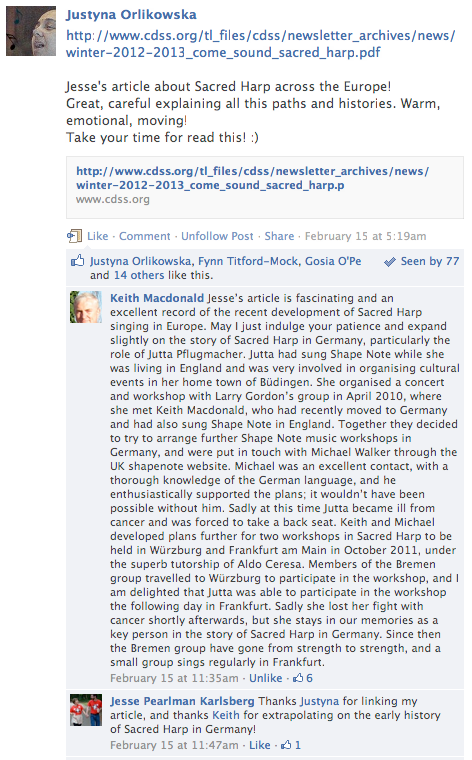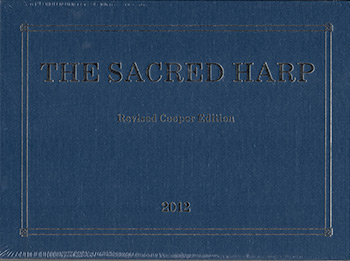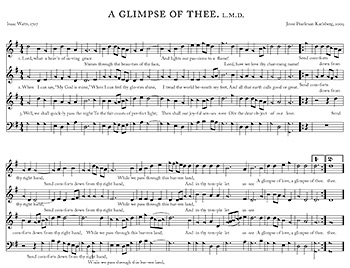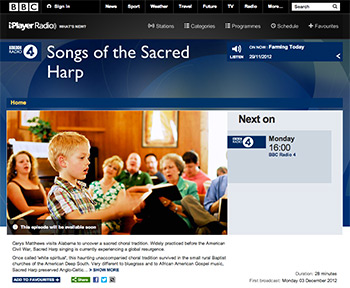On Saturday April 6, 2013 I will be teaching a singing school at the Cameron Art Museum in Wilmington, North Carolina. Co-presented by the Cameron Art Museum and WHQR Public Radio, the day will begin with an hour-long introduction to Sacred Harp singing at 10 am. Following a break we’ll spend the rest of the day singing from The Sacred Harp, stopping for lunch at noon. Thanks to Cleve Callison for organizing the event. If you’re in the Wilmington area, please join us on the sixth!
Author: Jesse P. Karlsberg
New Writing on Sacred Harp in Europe
In the wake of my trip last September to attend the seventeenth United Kindom and first Poland Sacred Harp Conventions and to teach at the first European session of Camp Fasola (held the week between these two conventions) I’ve continued to think and write about how Sacred Harp singers conceive of community, tradition, transmission, and place as the style spreads.

In November I wrote for the Country Dance and Song Society News on how these September singings “facilitate[d] cultural exchange, … inspire[d] community, and forge[d] emotional and spiritual connections” among European and North American singers. My essay, “‘Come Sound His Praise Abroad’: Sacred Harp Singing across Europe,” attempts to contextualize these recent events by recounting the introduction of this music to various European countries since 2008. In a comment on Facebook, Keith Maconald helpfully expanded on my account of the early history of Sacred Harp singing in Germany, pointing to the role he and the late Jutta Pflugmacher played in arranging for the Sacred Harp singing schools that Michael Walker and Aldo Ceresa held in Germany in October, 2011 (see screenshot from Facebook at right). I’ve transcribed a portion of Macdonald’s important comment below.
Jutta [Pflugmacher] had sung Shape Note while she was living in England and was very involved in organising cultural events in her home town of Büdingen. She organised a concert and workshop with Larry Gordon’s group in April 2010, where she met Keith Macdonald, who had recently moved to Germany and had also sung Shape Note in England. Together they decided to try to arrange further Shape Note music workshops in Germany, and were put in touch with Michael Walker through the UK shapenote website. Michael was an excellent contact, with a thorough knowledge of the German language, and he enthusiastically supported the plans; it wouldn’t have been possible without him. Sadly at this time Jutta became ill from cancer and was forced to take a back seat. Keith and Michael developed plans further for two workshops in Sacred Harp to be held in Würzburg and Frankfurt am Main in October 2011, under the superb tutorship of Aldo Ceresa. Members of the Bremen group travelled to Würzburg to participate in the workshop, and I am delighted that Jutta was able to participate in the workshop the following day in Frankfurt. Sadly she lost her fight with cancer shortly afterwards, but she stays in our memories as a key person in the story of Sacred Harp in Germany. Since then the Bremen group have gone from strength to strength, and a small group sings regularly in Frankfurt.
Michael Walker also touched on this early history in his essay on the October, 2011 German singing schools for the Sacred Harp Publishing Company Newsletter, “German Singing Schools: Sacred Harp Comes to the Land of J. S. Bach.”
In February I wrote for the Southern Spaces Blog on how the Sacred Harp events in Europe in September, 2012 “served as sites around which singers negotiated their associations of Sacred Harp singing with place.” My blog post—“Sacred Harp, ‘Poland Style’”—described how singers intentionally created what we described as a new “local tradition” of leading P. Dan Brittain’s song “Novakoski” with a time change from slow to moderate-fast at the start of the fuging section. The piece also noted how new singers from Poland and from Norwich in the United Kingdom have appropriated songs in The Sacred Harp bearing the names “Poland” and “Norwich” as symbols of their local Sacred Harp singing communities. My post was published the day before I left Georgia for another European singing trip, this time to Ireland for the third Ireland Sacred Harp Convention. Imagine my delight when the day after I arrived P. Dan told the story of “Novakoski,” “Polish Style” and led the song in the manner described above during his singing school the evening before the convention. Later, during the convention itself, a group of Polish singers led “Poland” and a group of singers from Norwich led “Norwich.” Quod erat demonstrandum.
Earlier in February I spoke about Sacred Harp in Europe at a conference titled “Southern Sounds/Out of Bounds: Music and the Global American South” held at the University of North Carolina, Chapel Hill and organized by the university’s Center for Global Initiatives and Center for the Study of the American South. My paper, “Digital Transmission and Mutable Tradition among European Sacred Harp Singers, 2008–2012,” addressed how European singers have supplemented transmission through travel to singings in the United States with reliance on digital resources such as YouTube videos shared through Facebook, and described how these singers are attempting to strike a balance between adhering to what they see as “traditional” practices while adapting Sacred Harp to new local contexts.
In addition to my two short essays and conference talk, two other short pieces on the Sacred Harp singing events in Europe last fall have recently been published. Gosia Perycz and Fynn Titford-Mock each contributed singing reviews on these three events to the Sacred Harp Publishing Company Newsletter. Their essays: “A Hollow Square in My Homeland: Bringing Camp Fasola to Poland” and “Celebrating Sacred Harp in Europe, September, 2012” describe the U.K. Convention, Camp Fasola Europe, and the Poland Convention in detail and are well worth a read.
Akerman Published in The Trumpet
My tune “Akerman” is included in the latest issue of The Trumpet. I wrote “Akerman” as a present for Laura Akerman in recognition of her thirty-five years at Emory. With help from John Plunkett, Sarah Ward, and Mark Godfrey, I selected a text titled “The books of nature and of scripture,” which we felt might be appropriate for a librarian, and incorporated some musical characteristics of Laura’s favorite compositions.
“A Glimpse of Thee” in The Sacred Harp: Revised Cooper Edition

My song “A Glimpse of Thee” is included in The Sacred Harp: Revised Cooper Edition (Samson, AL: Sacred Harp Book Company, 2012). The song appears on the last page of the book before the index and is re-titled “National Blessings” with an alternate text selected by the book’s revisors.
Colloquially known as the “Cooper book,” this 2012 Sacred Harp edition is the latest in a revision chain stretching back to a 1902 edition of the songbook edited by Wilson Marion Cooper. The first of three competing attempts to refashion the nineteenth century shape-note tunebook for a contemporary audience in the early twentieth century, the “Cooper book” found a following in the area of southeastern Alabama, southwestern Georgia, and north Florida where it was published, as well as in east Texas—it remains the Sacred Harp revision of choice in these areas. ((The songbook was also used alongside other editions of The Sacred Harp in Mississippi, northeast Alabama, and elsewhere.))

More recently, the “Cooper book” has found new audiences across the United States and beyond, often along pathways forged by reciprocal travel between singers from these places in Georgia, Alabama, and Texas, and areas where Sacred Harp singing (primarily from the competing revision chain represented by The Sacred Harp: 1991 Edition) has spread since the 1970s. This new edition alludes to the recent spread of singing from the “Cooper book” through the inclusion of compositions by singers from these new areas and through the titles of some of these singers’ songs, which refer to places (such as “North Jersey”) and people (such as “Gosia [Perycz]”) who are part of this more recent wave of interest in the songbook. ((The 2012 “Cooper book” includes fourteen new tunes, twelve of which are by living composers. These composers hail from Alabama, Florida, Georgia, Minnesota, New York, Oregon, Texas, and Washington.))
I wrote “A Glimpse of Thee” as a setting for Watts’s 1707 hymn “Lord, what a heaven of saving grace …” in August, 2009 while at home in Troy, New York. The “Cooper book” version, “National Blessings,” features the first, second, and fifth stanzas of a hymn written by Alfred A. Woodhull in 1828 which appears in Benjamin Lloyd’s Primitive Hymns ((Wetumpka, AL: published for the proprietor, 1841. Woodhull’s hymn is number 584, the first in the section titled “National Hymns.”)) with the title “God acknowledged in national blessings.”
Copies of The Sacred Harp: Revised Cooper Edition are available from Bill Aplin, Secretary/Treasurer of the Sacred Harp Book Company. Checks, made payable to the book company, may be sent to Aplin at 200 S. Johnson St., Samson, AL 36477. The price for a single book is $25 including shipping. More information is available in chapter one of Steven L. Sabol’s resource guide.
Nice New Guide to Some Good Introductions Sacred Harp History
London Sacred Harp singer Rebecca Over has authored a useful survey of several good books that might serve as further reading after The Sacred Harp itself and as useful introductions to Sacred Harp history.
Songs of the Sacred Harp on BBC Radio 4
BBC Radio 4 will air a half-hour–long documentary on Sacred Harp singing on Monday, December 3 at 4 pm GMT (11 am EST). You can listen live online at the link above—or access a recording through the BBC’s iPlayer for a week after the broadcast. The documentary is the result of a visit by host Cerys Matthews and producer Joby Waldman to the Lacy Memorial Singing in northeastern Alabama this past July. In addition to attending and recording the singing, Cerys and Joby interviewed a number of singers, and attended a short singing school I taught at the home of Henry Johnson.

In the wake of her encounter with Sacred Harp this past summer, Cerys has helped promote Sacred Harp singing in the United Kingdom, playing Sacred Harp recordings on her weekly BBC Radio 6 show “Cerys on 6.” A recent segment during which about a dozen singers led by Michael Walker sang live on her show helped bring about sixty singers to the singing in Bloomsbury the next day.
Cerys and Joby interviewed me for about an hour and a half after our singing school and I am a featured contributor to the documentary. We spoke about the history of Sacred Harp singing and related genres and I tried to express what draws me to this music and why I think it is experiencing an influx of new singers in Europe and across the United States. I sought to counter the narrative—often expressed in media portrayals of Sacred Harp—that it is an “archaic” “survival” from the distant past now being taken up by exotic newcomers, yet that narrative is present to a degree in the blurb for the piece:
Cerys Matthews visits Alabama to uncover a sacred choral tradition. Widely practiced before the American Civil War, Sacred Harp singing is currently experiencing a global resurgence.
Once called ‘white spiritual’, this haunting unaccompanied choral tradition survived in the small rural Baptist churches of the American Deep South. Very different to bluegrass and to African American Gospel music, Sacred Harp preserved Anglo-Celtic practices that were subsequently lost in the UK.
Today, this music is spreading from the Deep South around the US and is even developing a following in the UK. Cerys travels to an all-day singing convention in Alabama to find out why the music is not just surviving but flourishing. In an age when church attendance is dropping fast, what is attracting people all over the US and the UK to sing archaic hymns?
Also called ‘shape note singing’, the music is based around the Sacred Harp hymn book compiled in Georgia in 1844. The pages show different shapes above the words to indicate the notes, enabling songs to be sung on sight. Gatherings are arranged in a hollow square with the self-selected leader entering the middle to call out the number of their chosen song. No applause or audience is allowed. Far removed from ‘happy clappy’, they are often austere hymns with themes of death and the pain of everyday existence.
Contributors include Hugh McGraw, Jesse Karlsberg, Warren Steele [sic], Reba Del Windom, Henry Johnson, Michael Walker, Emma Rose Brown and Sam Carter.
For information on Sacred Harp singing around the UK:
http://www.ukshapenote.org.uk/
http://londonsacredharp.org/Produced by Joby Waldman
A Somethin’ Else production for BBC Radio 4.
I think this “archaic” label simultaneously makes Sacred Harp singing appealing to newcomers looking for something “authentic” and renders it unappealingly old-fashioned to those in areas where the music has a long history. Despite its ambivalent effect, the narrative is an almost omnipresent part of promoting Sacred Harp singing. While it’s perhaps unavoidable that this narrative has found its way into “Songs of the Sacred Harp,” it’s encouraging that this treatment will be a half-hour in length—enough time to complicate any narrative—and exciting to see Cerys utilize her media access to bring the Sacred Harp singing to a wider audience in the U.K. I look forward to hearing the documentary on the 3rd.
Talk on Sacred Harp Singing at Kennesaw State University
This Tuesday from 12:30–1:45 pm I’ll be giving a talk on Sacred Harp singing and its history, followed by a short singing school, for the Canterbury Club at Kennesaw State University. Please contact me if you’re interested in attending.
Recent Bulletins on the Southern Spaces Blog
I’ve written two recent posts for the Southern Spaces Blog’s Bulletin compiling news “from in and around the U.S. South.” For the October 18 issue of The Bulletin, I reported on activism surrounding the fortieth anniversary of the 1972 Clean Water Act and decisions by southern states to opt out of Medicaid expansion under the new health care law. In the November 15 issue of The Bulletin, Alan Pike and I surveyed post-election “visualiz[ations of] the geography of political power,” focusing on the historical roots of urban/suburban political divides in metropolitan areas in the interior and rhetoric about the persistance of a “solid South” in presidential politics.
Singing School at the Pacific Northwest Sacred Harp Convention
Lauren Bock and I will be teaching a singing school in Portland, Oregon on October 20 at the Fall session of the Pacific Northwest Sacred Harp Convention. Our singing school will focus on the importance of listening while singing and will touch on accent, leading, and aspects of singing style. The Pacific Northwest Convention is free and open to the public. Come see us later this month in Oregon.
Singing School at North Georgia College and State University
I’ve been invited by the Rev. Dr. Barry Whittemore to teaching a singing school on October 3 for his seminar on the history of religion in Appalachia at North Georgia College and State University in Dahlonega, Georgia. The singing school will be held from 5:30–8:00 at the Georgia Mountains Unitarian Universalist Church. All are welcome to attend.